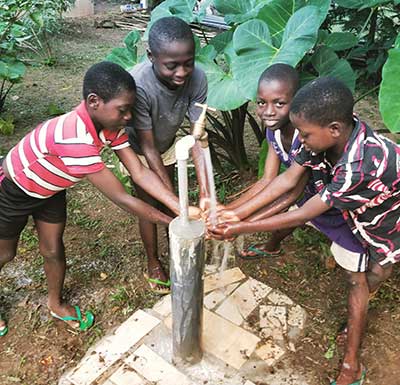At Home
Dispatch from Rural Ghana

… where Hand Washing is Sustainable on Purpose
Two years ago, Brooklyn’s Stephen Mohney and Donald Yao Molato, in Ghana, provided Our Time Press with a report on sustainability projects in the rural village of WLI ((pron. Will-lee) Afegame. Mohney, a former P.S. 3 teacher and Environmental Coordinator, is founder of Tech4Ghana, a nonprofit that helps rural Ghanaian children have access to learning technology and literacy. Mr. Molato is the project’s onsite Director. In the team’s first dispatch (Our Time Press, Fall 2018) the water was not drinkable. Following is an update to that story in text and photos.
May 7, 2019
Dear Bernice (and all),
I apologize for the delay in replying to your most encouraging email. Life happened.
I traveled to rural North Carolina to celebrate my mother’s 97th birthday on March 1st. I had planned to return on the 24th but, by then, NYC was in crisis and I decided to shelter-in-place with her. I don’t know when I will be able to return. Of course, I continue my daily contact with Yao and support Tech4Ghana.
I’m so sorry to hear about the passing of Phil Goldman, who donated to the project. We appreciate his admiration for our work to serve seven schools in three communities (Wli, Fodome Ando, and Likpe Bakua) with free access to our Instructional Technology and English language literacy resources.
The past two years have been remarkable. The schools’ ICT teachers book appointments so that they can bring their classes to instruct them with our resources, none of which they have in their classrooms. We have nearly a full class set of laptops for the students. The teachers utilize our laptop, LCD projector, document camera, large wall-screen, and a public address system for their instruction in the large Computer Lab. In September 2009, the Computer Center opened. We added a small library, as you know, in 2011. Over the years, books have been shipped in barrels from Brooklyn.



We bus in the classes from two communities in either direction down the road from Wli. To ensure that instruction is not interrupted by the frequent power outages that are common, we use a gasoline-powered generator for electricity when necessary. (Solar power is our dream.)
Teachers borrow books from our Library for their classrooms and for their students to read. None of their schools have a library or appropriate-level books for their English language learners.
We have finished construction of the future community Library/Media Center for access to the public, not only for our school classes. It will have Internet enabled computers and printing/copy capacities.
Our Environmental Science Center is finished and awaiting resources. Tech4Ghana continues our re(rain)forestation on the property we own and hope to expand. The forest will be a living laboratory of environmental science for the teachers from our participating schools and their students, as well as for visitors’ research and birdwatching.
The ecological flora diversity that we have nurtured — both by our forest and campus gardens — support communities of birds, butterflies, pollinators, and other species of wildlife, the presence of which were becoming extant in Wli/Afegame.
Prior to Tech4Ghana’s water-relief effort, these families either depended on one of the two borehole well hand-pumps in the Wli village, or the nearby river. They also collected rainwater from their roofs. Some have a water storage and/or rain-collecting barrel. Several years ago, Yao had the foresight to build a septic tank, as he imagined Tech4Ghana’s essential expansion. And needs. He knew that we would have to build Restrooms, for class visits.
Source water became an issue when the water table dried up during the dry season. And during other times, the villagers could not draw from the water due to the layers of algae growing on top of it. He had to purchase water from the nearby biggest town.
The water always had suspended silt. It was not drinkable, without boiling. Too, there was no way that, even in the rainy season, it could support the needs of the Restrooms.
As previously reported, my Brooklyn friend Kofi found a borehole well driller, and we hired him to ascertain whether or not the Tech4Ghana campus had aquifer water beneath it. He thought so, and we took the gamble to drill through the bedrock.
Yao’s photos clearly show how the head-pans are filled by elevated pipes – as the person who is collecting it, stands. This convenience avoids him/her having to bend over to lift the very heavy water-filled pan to the head, usually with the assistance of another person. Sometimes, still, they choose to fill the pans with the faucets as the pan sits on the floor.
Now, as per Ghana government instructions, we share our aquifer water with the residents of the community, who otherwise have limited access to clean water. And, as you can see, Yao has successfully established a handwashing station at Tech4Ghana’s campus gate.
Tech4Ghana USA is a Brooklyn, New York based nonprofit organization registered in New York State and is a 501(c)3 public charity, as designated by the U.S. Department of Treasury/IRS. It was established in the US to raise money to support the work of Tech4Ghana, which is a registered nonprofit in Ghana. Donations are tax-charitable deductions to the fullest extent of the law.
Please visit the Tech4Ghana website to view documentation of more than ten years of development in Wli, from 2009 to the present: www.tech4ghana.org
(Bernice Elizabeth Green, Editor, Our Time AT HOME)


